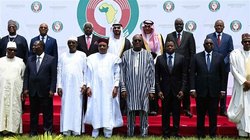 The leaders of West African countries have announced a one-billion-dollar plan to combat the growing threat of Takfiri terrorism and violence in the region.
The leaders of West African countries have announced a one-billion-dollar plan to combat the growing threat of Takfiri terrorism and violence in the region. RNA - The plan was unveiled at a summit of the heads of state and government of the Economic Community of West African States (ECOWAS) in Burkina Faso’s capital, Ougadougou, on Saturday.
ECOWAS Commission President Jean-Claude Kassi Brou said the 15-member West African bloc had decided to “contribute financially and urgently to joint efforts in the fight against terrorism” by pledging $1 billion.
Full details of the plan, to be funded from 2020 to 2024, would be presented to the next ECOWAS summit in December.
In his remarks, the president of the ECOWAS commission pointed to the mounting human, economic and political toll of terrorist attacks perpetrated by Takfiri groups in the region.
"2,200 attacks in the last four years, 11,500 dead, thousands wounded... millions displaced and economic activity has been greatly affected," Brou said.
In a speech following the closed meeting, Brou called on the United Nations to strengthen its peacekeeping mission, which has been based in Mali since 2013.
Takfiri terrorist groups tied to Daesh and al-Qaeda have strengthened their foothold across the arid Sahel region this year, making large swathes of territory ungovernable and stoking local ethnic violence, especially in Mali and Burkina Faso.
The UN declared in July that the spread of terrorist attacks was so fast in West Africa that the region had to consider bolstering its response beyond current military efforts.
In 2017, Burkina Faso, Niger, Chad, Mali and Mauritania launched the G5 Sahel task force to counter militancy in the region.
The 5,000-strong force was to receive more than 400 million euros (494 million dollars) to be able to meet its declared objectives but a lack of finance, training and equipment limited their effectiveness and their numbers plunged to 4,000 troops.
Meanwhile, the International Committee of the Red Cross (ICRC) has warned that the military approach alone would not be effective and called for greater efforts to relieve the roots of the conflict in the region, namely poverty, poor governance, and climate hazards.
847/940